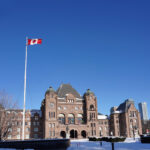A quiet health alarm has been triggered across the Greater Toronto Area as public health officials confirm two separate measles cases in Vaughan, marking an unusual occurrence for a disease long considered effectively managed through routine vaccination. These cases have mobilized a coordinated response from Peel Public Health as they work to contain any potential spread of this highly contagious viral infection.
The two individuals affected have no known connection to each other, raising questions about possible wider community transmission. According to Dr. Helena Martins, Associate Medical Officer at Peel Public Health, both patients recently traveled internationally, suggesting they likely contracted the virus abroad rather than locally.
“We’re taking these cases very seriously,” Dr. Martins explained during yesterday’s briefing. “Measles is one of the most contagious infectious diseases, capable of spreading rapidly through airborne transmission to anyone who isn’t adequately immunized.”
Public health teams have launched comprehensive contact tracing efforts, identifying locations where potential exposure may have occurred. Officials have released a timeline of possible exposure sites including a pharmacy on Rutherford Road, several restaurants in Vaughan Mills shopping center, and a medical clinic in the Highway 7 and Weston Road area between March 15-22.
The resurgence of measles in regions with historically high vaccination rates reflects a troubling global trend. According to the World Health Organization, measles cases increased by 18% globally in 2023, with over 300,000 reported cases – a figure experts believe significantly underrepresents actual numbers.
Dr. Anita Collins, infectious disease specialist at Toronto Western Hospital, notes that Canada’s measles elimination status, achieved in 1998, is increasingly precarious. “These isolated cases demonstrate how quickly vaccine-preventable diseases can reappear when immunization rates drop below the threshold needed for community protection,” she told CO24.
The timing coincides with declining vaccination rates in parts of the Greater Toronto Area, a trend public health officials have been monitoring with growing concern. In some neighborhoods, MMR (measles, mumps, rubella) vaccination rates have fallen below 85% – significantly lower than the 95% needed to maintain herd immunity against measles.
Ontario’s Ministry of Health has responded by launching an urgent vaccination campaign targeting areas with lower immunization rates. “These cases in Vaughan serve as a powerful reminder that measles remains a serious threat,” said Ministry spokesperson David Harrison. “The most effective protection continues to be vaccination.”
For parents and community members concerned about potential exposure, health officials recommend checking immunization records and contacting healthcare providers if there’s uncertainty about vaccination status. The classic symptoms of measles include high fever, cough, runny nose, red eyes, and a distinctive rash that typically appears several days after initial symptoms.
While both Vaughan patients are reportedly recovering at home under medical supervision, their cases highlight the delicate balance between public health achievements and ongoing vigilance. As Canada navigates increasing vaccine hesitancy alongside global mobility, these isolated outbreaks raise a critical question: Are we prepared to defend the public health gains of previous generations, or will preventable diseases of the past find new footholds in our modern communities?

























